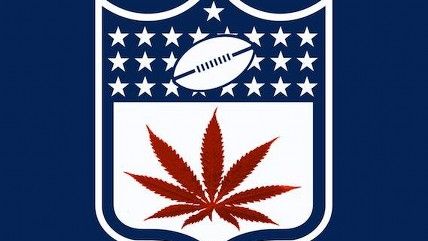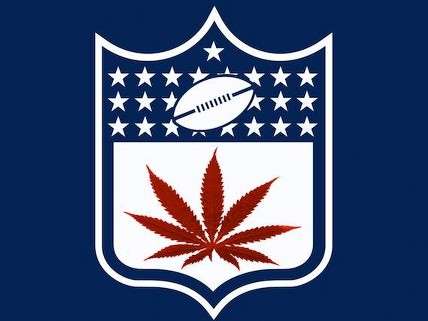NFL Should Permit Players to Use Medical Marijuana, Ex-Players Say
Pro football lives on massive consumption of painkillers, but still bans therapeutic use of pot.

The relentless violence of pro football,

combined with the fact that the vast majority of National Football League (NFL) players work under contracts that can allow them to be summarily cut even if they are unable to play due to injury, means the league is awash with the use of prescription painkillers. And yet, despite the fact that medical marijuana is legal in 20 states where the NFL has franchises, the league continues to keep the drug on its banned substance list.
A group of former NFL players, including tight end Nate Jackson and offensive tackle Kyle Turley, are lobbying to change this. A recent article by Scott Keyes in The Guardian focuses on their efforts to expose the league's complicity with team doctors and coaches to rush players back onto the field by loading them up with painkillers, which beyond being addictive, can cause players to overexert themselves and make their injuries far worse.
Keyes writes:
To hurry players back from injury, a cocktail of pain pills and anti-inflammatory injections are typically dispensed. Hydrocodone, Vicodin, Percocet, Toradol, Celebrex, Vioxx (before it was recalled for increasing the long-term risk of heart attacks and strokes) and so on. The widespread use of highly potent prescription pain drugs, some argue, has allowed the NFL to become the multibillion-dollar industry that it is today, but at a price.
A 2011 study by researchers at Washington University in St Louis found that former NFL players were four times more likely to abuse prescription painkillers than the general population. And more than seven in 10 players who used pain medications during their playing days went on to abuse them, though former offensive tackle Kyle Turley said he thinks that number is actually closer to 90%.
Turley and Jackson are among a group of former players trying to fight this epidemic of prescription drug abuse by lobbying the NFL to change its policy and allow players access to an alternative: medical marijuana.
Turley has been outspoken about the harrowing side effects he attributes to his use of prescription painkillers. In a recent ESPN interview, Turley said:
I wanted to jump out of a third story window of my house and my wife had to stop me one night. So I stopped taking that. Then went to depakote, found great relief in depakote, but the longterm use of that surfaced all these other problems. And depression, anxiety, light sensitivity got worse, and suicidal and homicidal tendencies became a part of my daily living, in that I couldn't be around a knife in my kitchen without having an urge to stab someone, including my wife and kids. That was highly disturbing to me.
But, Turley told The Guardian, once he got a medical marijuana prescription in California, he successfully transitioned off off all painkillers, even over-the-counter ones like aspirin. He has since founded the Gridiron Cannabis Coalition, made up of ex-NFLers who say their former league is "plagued with multiple ailments and diseases currently void of non-addictive treatments or cures." The Coalition advocates "to resolve this impasse to allow players and the public the option of an organic treatment for injury and illness through Cannabis," as well as league-funded research on medical marijuana.
The league's policing of cannabis is half-hearted, to be sure. Players are only tested once during pre-season, and such lax enforcement leads Jackson to suggest that more than half of active players are probably self-medicating with marijuana. Keyes notes that the "the league only began testing players for marijuana in the 1980s, a direct result of the emerging national 'war on drugs.'"
It's not just marijuana. In professional sports, painkillers are inexplicably legitimized over less-toxic drugs used for therapeutic purposes. Last week, I wrote about the ongoing controversy surrounding Denver Broncos quarterback Peyton Manning, who allegedly received shipments of human growth hormone (HGH) while recovering from a broken neck, according to an Al Jazeera report. In the piece, I questioned the wisdom of banning a non-opiod substance that helps players heal from potentially devastating injuries, but allowing (and even encouraging) injured players to be doped out of their minds on painkillers.
After former Reasoner Radley Balko tweeted the story to his followers, it led to a very interesting exchange between Dallas Mavericks owner Mark Cuban (who is currently financing research on the use of HGH to heal ACL injuries) and former NFL Pro Bowler Seth Joyner.
Joyner insisted that Manning deserved to be vilified if he used the banned "performance-enhancing drug" and groused about "How diff may my career been if I coulda used HGH to heal." Cuban replied by asking, "how many guys did u play with that hurt when they move or have liver problems because of drugs they had to take?" and added, "I'm trying to change the cycle from reactive to proactive in the NBA. The NFL is their own worst enemy." This seemed to at least partially impress Joyner, who replied, "They're dinosaurs and very leery about anything new or out of the box thinking wise given all the concussion heat!"
The NFL generates more than $7 billion annually, but its drug and health issues are not going away. After seeing the new film Concussion, which dramatizes the true story of the effort to prove the link between traumatic brain injury and the NFL, Pro Bowl offensive lineman D'Brickashaw Ferguson penned an op-ed for Sports Illustrated in which he says the movie made him feel "betrayed" by the league.
When prominent active players are willing to go on record, calling out the league regarding its treatment of injured players, it should serve as a warning to the "dinosaurs" that it's time to evolve.


Show Comments (51)